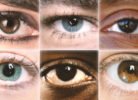Before you see anything, you see yourself. In other words, everything you see and experience is filtered through your personal frame of reference, and therefore everything gains a unique sense in your mind which sense cannot be shared with anyone else in the exact same way.
But this is only the most superficial aspect of the fact that before you see anything, you see yourself.
Coming to the world at a certain point of a timeline of existence doesn’t imply that there is nothing before that particular point of existence. In other words, being materially-biologically born doesn’t automatically mean that before your material-biological birth, there was nothing for you, or nothing of you existed. Something certainly existed: you. For what you are is much more than your body-husk.
 Beyond that husk, there is your self. There is the you: who you are, what you think, your philosophy, your wisdom, your identity, your personality, your timeless, spaceless, absolute, perfect, uncorrupted existence. A mysterium tremendum that empirical science world avoids, hates, ignores, fears, misunderstands.
Beyond that husk, there is your self. There is the you: who you are, what you think, your philosophy, your wisdom, your identity, your personality, your timeless, spaceless, absolute, perfect, uncorrupted existence. A mysterium tremendum that empirical science world avoids, hates, ignores, fears, misunderstands.
Your material life, that is, your biological body is not you, only a limited time-space manifestation of what is you, what is eternally you, your eternal self. Your self is not your body. Your body is one of the many manifestations of your self. Your deliberate, morally conscious decisions are another way for your self to express itself.
It is not true that your decisions have to do with your body, not even if your decisions are formulated via your body parts. Your body makes biological decisions like breathing, urinating, eating, or mating, but it is certainly not your body that makes your moral decisions. The source of your moral decisions is something that is beyond your body: your self, your moral stance, your personality, your (spiritual) self-awareness, your consciousness of selfishness and altruism.
Although science is trying to prove that the self is the same as the body, and therefore the self cannot exist without the body, science could not be farther from the truth. Although the two are now interrelated in your self’s bodily manifestation, they remain two separate entities.
Consider human morality. What makes us to be so explicitly clear and unambiguous about the idea that altruism is morally good, and selfishness is morally bad? Maybe the fact that selfishness harms others. But why is it wrong to harm others? Why didn’t we agree in the first place that harming others is a morally OK thing to do? Why do we consider moral criteria at all? Why don’t we simply ignore morality? Wouldn’t our life be easier without considering ethics – the way animals and nature live? Isn’t morality something that we impose on ourselves, without anyone asking us to do so? And if so, isn’t morality a power superior to our body, biology, and matter? And if morality as a set of life-regulating and life-ruling principles is a stronger power than matter and biology, then isn’t it something separated from matter and biology, that is, from our body? Can’t we say that the set of our moral principles, our ruling identity, our guiding self, indeed exists without the body?
The body seems to be a simple manifestation of man’s primarily moral (spiritual) nature. You don’t exists because you have a body, but you have a body because you exist. And if this is true, then we had had to exist before we took this bodily manifestation on. We saw ourselves, we knew our true nature, our naked human essence, our spiritual-moral dimension before our birth, therefore, it is inevitable that now, in body, we see everything through the lenses of our primary spiritual knowledge, and we filter every information through our pre-existent spiritual self.
Before you see anything, you see yourself. After you see yourself, you see everything else through the measures of your self.
What this means is a lot to bear: we don’t only live in this world without touching it, humbly submitting ourselves to an independent material reality, but we shape the world and create reality according to what we saw before this material world, according to who we really are. Our life is the projection of our spiritual information onto matter. A fusion of the spiritual with the material, a fusion of the perfect with the imperfect. This is why we look for perfect forms, perfect lines, perfect shapes, perfect solutions, perfect moments, perfect experiences, perfect emotions, perfection itself. This is why we try to bend and stretch matter, and force an idealistic perfection onto it. This is how from a shapeless, ungainly, amorphous matter we bring out perfect lines and shapes, harmonious forms and figures, calming patterns, sense and logic. This is how we import the notion of perfection from a spiritual reality into a material world of imperfection, and try to mold matter accordingly. This is how man sees the world, how he interprets it, how he understands it, how he works it, how he shapes it, how he actually creates it.
Before you see anything, you see yourself. After you see yourself, you see everything else through the measures of your self.





















